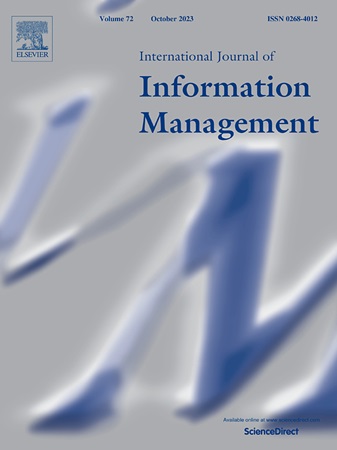Using the influence of human-as-machine representation for self-improvement products
IF 27
1区 管理学
Q1 INFORMATION SCIENCE & LIBRARY SCIENCE
International Journal of Information Management
Pub Date : 2024-10-15
DOI:10.1016/j.ijinfomgt.2024.102851
引用次数: 0
Abstract
With the continuous growth surrounding technology advancements, evaluating ways to utilize this tool to its best abilities is important. This research focuses on using machine-like representations in marketing, expanding on the existing theories of anthropomorphism and dehumanization. Portraying specific body parts as machines can effectively stimulate consumers' motivation to enhance the corresponding capabilities, thereby improving their preference for self-improvement products. Three dimensions of human-as-machine representation are explored: the human brain, heart and arms, experimentally demonstrating that they help consumers identify areas of inadequacy and boost self-improvement motives, especially when self-control is low. Across four studies, study 1 examines the main effects of human-as-machine representation on consumers’ preference for self-improvement products. Study 2 tests the mechanism of self-improvement motives for abilities. Study 3 examines the interaction effect of human-as-machine representation and level of self-control (high vs. low) on consumers’ self-improvement motives for skills and preference for self-improvement products. A final qualitative study was conducted to reveal nuanced distinctions in participants' perspectives on human-as-machine representations, comparing findings across the previous three studies, and identifying opportunities and challenges. Ultimately, the findings suggest that portraying precise body parts as machines enhances the desire to improve the corresponding skills, resulting in a better preference for self-improvement products.
利用 "人即机器 "表征的影响力开发自我改进产品
随着技术进步的不断发展,评估如何最大限度地利用这一工具非常重要。本研究的重点是在市场营销中使用类似机器的表现形式,并对现有的拟人化和非人性化理论进行扩展。将特定的身体部位描绘成机器,可以有效激发消费者增强相应能力的动机,从而提高他们对自我提升产品的偏好。研究探讨了人脑、心脏和手臂这三个维度的 "人体即机器 "表征,实验证明它们能帮助消费者发现不足之处,增强自我提升的动机,尤其是在自我控制能力较低的情况下。在四项研究中,研究 1 探讨了 "人即机器 "表征对消费者自我提升产品偏好的主要影响。研究 2 检验了能力自我提升动机的机制。研究 3 探讨了 "人即机器 "表征和自我控制水平(高与低)对消费者技能自我提升动机和自我提升产品偏好的交互影响。最后一项定性研究旨在揭示参与者对 "人即机器 "表征的细微差别,比较前三项研究的结果,并确定机遇和挑战。最终,研究结果表明,将精确的身体部位描绘成机器会增强人们提高相应技能的愿望,从而使人们更加偏好自我提升产品。
本文章由计算机程序翻译,如有差异,请以英文原文为准。
求助全文
约1分钟内获得全文
求助全文
来源期刊

International Journal of Information Management
INFORMATION SCIENCE & LIBRARY SCIENCE-
CiteScore
53.10
自引率
6.20%
发文量
111
审稿时长
24 days
期刊介绍:
The International Journal of Information Management (IJIM) is a distinguished, international, and peer-reviewed journal dedicated to providing its readers with top-notch analysis and discussions within the evolving field of information management. Key features of the journal include:
Comprehensive Coverage:
IJIM keeps readers informed with major papers, reports, and reviews.
Topical Relevance:
The journal remains current and relevant through Viewpoint articles and regular features like Research Notes, Case Studies, and a Reviews section, ensuring readers are updated on contemporary issues.
Focus on Quality:
IJIM prioritizes high-quality papers that address contemporary issues in information management.
 求助内容:
求助内容: 应助结果提醒方式:
应助结果提醒方式:


